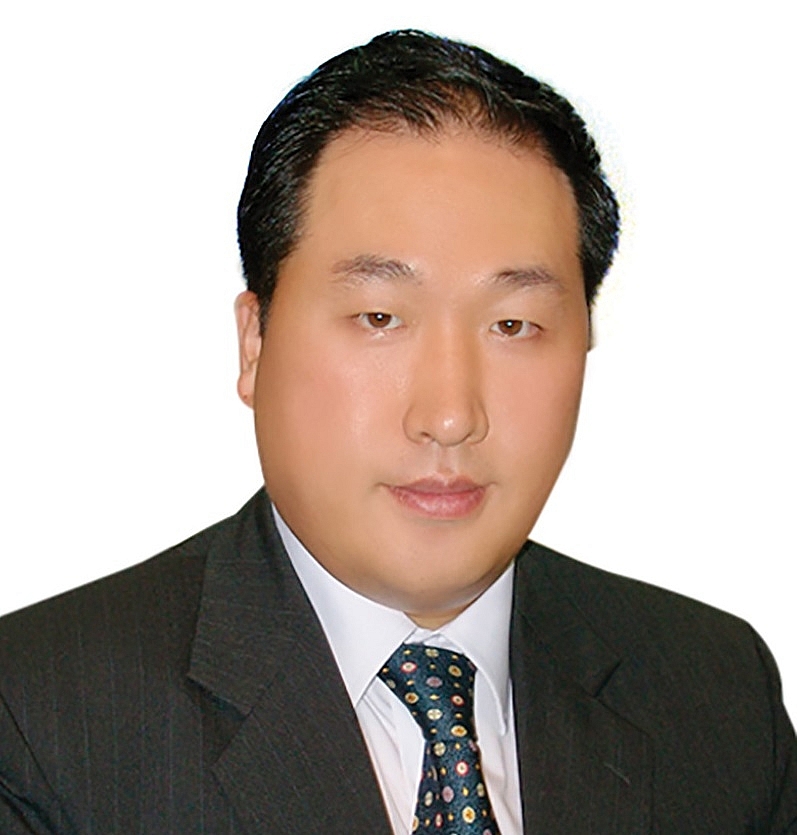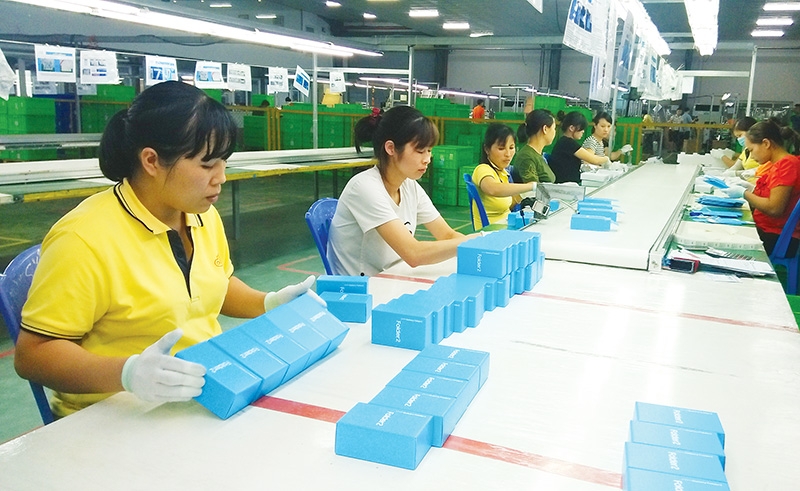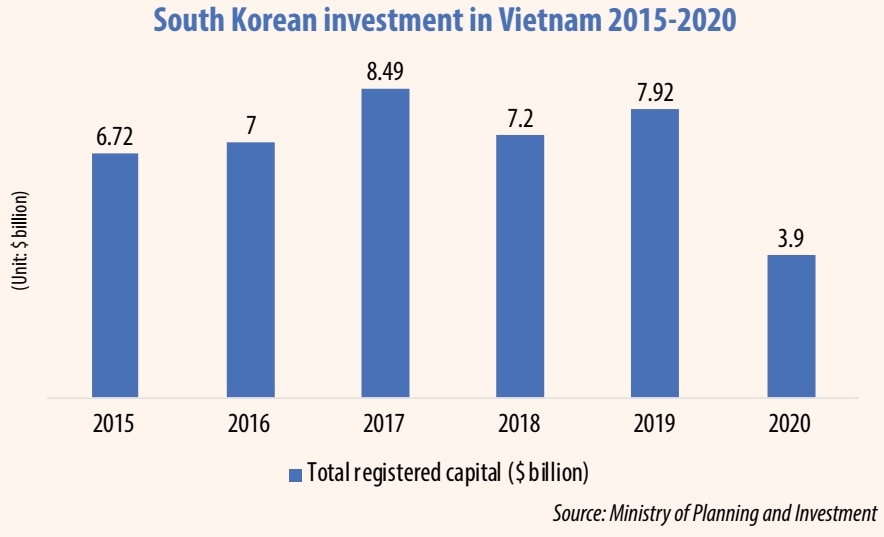South Korean focus on Southeast Asia perseveres
 |
| Hong Sun, vice chairman of the Korea Chamber of Business in Vietnam |
The global health crisis has hit markets and businesses around the world, including South Korean firms in Vietnam. However, its impacts in the country have largely been mitigated thanks to the proactive efforts of the Vietnamese government and wide public acceptance.
During 2020, Vietnam was a safe market for South Korean businesses. We saw few fresh investments in the country, while some existing investors still expanded their manufacturing. However, COVID-19 hindered many other new investments which often require trips and on-site surveys.
Highlights of 2020
Most large businesses, including South Korean ones, tried to maintain their activities. Vietnam remains an important market to them as the country is a safe destination for manufacturing activities of domestic and international companies alike.
Small- and medium-sized enterprises faced several challenges due to falling sales and revenues. However, South Korean investors were trying to help one another to keep operations running smoothly.
According to statistics from Vietnam’s Ministry of Planning and Investment, the country attracted $28.53 billion worth of newly-registered, newly-added, and stake-purchased, and capital contribution-based foreign investment in 2020, equivalent to 75 per cent of 2019. Among these, South Korea ranked second with over $3.9 billion, making up 13.8 per cent of the total and surpassing China, Japan, Taiwan, and Hong Kong.
One of the larger foreign-invested projects licensed in 2020 is the investment adjustment of the South Korean-invested West Lake Urban Centre West project with a total of $774 million. This project showed the interest and strong confidence of South Korean investors in the Vietnamese market. However, we are expecting some related issues to be solved soon to facilitate our members’ performance.
For example, one of the very important factors for every foreign venture is the acquisition and employment of specialists. At large factories like those of Samsung and LG, foreign experts are often needed to change product lines and adjust assembly lines.
Amid the pandemic, the Korea Chamber of Business in Vietnam has worked with the government and local authorities on supporting policies for South Korean investors. We focused on measures that enable the entry of experts and investors to Vietnam to continue their work. Many conferences and meetings were held to help our members ease the difficulties and secure business activities.
Like other foreign investors, South Korean businesses have enjoyed the supporting policies from the Vietnamese government, including preferential conditions for tax and customs.
The government’s swift and effective handling of COVID-19 has facilitated domestic and international business activities and contributed to a comfortable business climate. Moreover, the government has issued several supporting policies and laws, with the ones for investment, enterprises, and public-private partnerships being among the outstanding pieces of legislation. The latter offers clearer regulations and is expected to increase investors’ confidence in infrastructure projects. We also expect that the new Law on Investment will improve procedures and shorten the time for licensing.
 |
| Supporting policies and laws are going some way to encourage South Korean groups to venture even further into Vietnam, photo Le Toan |
New trends
As COVID-19 caused significant changes in daily life and business activities, businesses have been hosting online conferences and discussions. Moreover, the pandemic also impeded infrastructure activities with large-scale investments as well as fresh ones as investors could visit the sites.
In addition to a strong interest in manufacturing and entertainment, South Korean investors are also keen on startups. I have never before seen any South Korean investor coming to Vietnam to found an IT startup, but there were several during 2020.
 |
For example, Gomi, a South Korean-run tech startup was founded in Vietnam. The company’s e-commerce activities are popular in a country home to thousands of fashion lovers who enjoy the South Korean flair to the goods. Other South Korean tech startups in Vietnam include motorbike trading platform Ok Xe and room rental app Go2Joy.
All these businesses have been gaining good initial results and are expected to create a fresh and promising atmosphere among South Korean investors in Vietnam.
In addition to startups, South Korean businesses in Vietnam focused more strongly on finance and entertainment in 2020. Shinhan Bank and Wooribank are among the South Korean banks which are expanding rapidly.
We also saw many South Korean investors partaking in mergers and acquisitions.
In the property sector, several South Korean investors have been venturing into the local market, focusing on industrial parks and factories for lease, while many are also seeking licences to develop housing projects for low-income earners. In South Korea, social housing projects are popular, and they want to develop similar models in Vietnam, particularly in some surrounding areas of Hanoi.
Logistics centres are another focal point of South Koreans in Vietnam. At present, the number of logistics centres in Vietnam remains behind demand, causing the country’s logistics cost to be higher than in other countries.
The South Korean government’s Southern Policy now focuses on Southeast Asia and western South Asia and aims to increase bilateral trade with Southeast Asia to $200 billion in 2020, $100 billion of which come from Vietnam alone. This reflects the importance of the Vietnamese market in South Korea’s trade strategy. However, the global health crisis delayed many activities.
What the stars mean:
★ Poor ★ ★ Promising ★★★ Good ★★★★ Very good ★★★★★ Exceptional
Related Contents
Latest News
More News
- Foreign leaders extend congratulations to Party General Secretary To Lam (January 25, 2026 | 10:01)
- 14th National Party Congress wraps up with success (January 25, 2026 | 09:49)
- Congratulations from VFF Central Committee's int’l partners to 14th National Party Congress (January 25, 2026 | 09:46)
- 14th Party Central Committee unanimously elects To Lam as General Secretary (January 23, 2026 | 16:22)
- Worldwide congratulations underscore confidence in Vietnam’s 14th Party Congress (January 23, 2026 | 09:02)
- Political parties, organisations, int’l friends send congratulations to 14th National Party Congress (January 22, 2026 | 09:33)
- Press release on second working day of 14th National Party Congress (January 22, 2026 | 09:19)
- 14th National Party Congress: Japanese media highlight Vietnam’s growth targets (January 21, 2026 | 09:46)
- 14th National Party Congress: Driving force for Vietnam to continue renewal, innovation, breakthroughs (January 21, 2026 | 09:42)
- Vietnam remains spiritual support for progressive forces: Colombian party leader (January 21, 2026 | 08:00)

 Tag:
Tag:




















 Mobile Version
Mobile Version